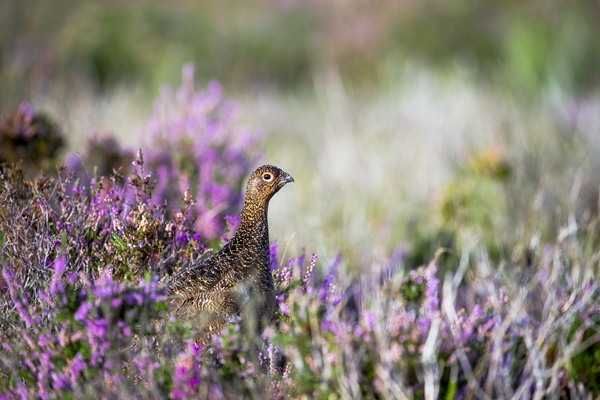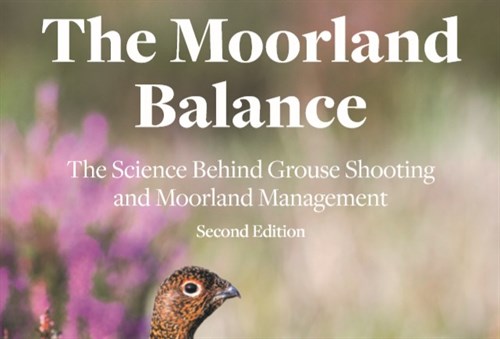
Grouse in heather. Picture by Tarquin Millington-Drake
THE science behind grouse shooting and moorland management is captured in a newly-published book by a leading research charity, the Game & Wildlife Conservation Trust (GWCT).
The Moorland Balance second edition, which builds on the success of the first book, draws on more than 200 different studies from across the scientific community, delivered in a question and answer format.
Detailed sections on controversial issues such as grouse shooting, heather burning, re-wetting moorland, predator control, illegal killing of raptors and mountain hares are included in this bumper 134-page book – which is twice the size of the first edition.
GWCT’s aim of this book is to present the scientific research so that the discussion is led by evidence, rather than emotion.
Chairman Sir Jim Paice, who wrote the foreword, said: “This book refers to evidence that were driven grouse management to end, either through draconian licencing or an outright ban, the knock-on effect would likely be the loss of our precious heather moorland and the rare wildlife and rural communities it sustains.”
“Anyone who reads these pages will make up their own minds about such an outcome, but they will start from the basis of scientific fact, rather than ideological opinion.”
Since the 1930s, the GWCT has been researching and developing game and wildlife management techniques and have had 135 scientific papers published in peer-reviewed journals on issues relating to upland ecology.
This research is used to provide advice to such statutory bodies as Defra, Scottish Natural Heritage and Natural England and practical advice and guidance to farmers and landowners.
This work is made possible because of our strong working relationship with other organisations, be it leading universities or other conservation bodies such as the British Trust for Ornithology, the Centre for Ecology and Hydrology and the RSPB.
Author Dr Jennifer Brewin, a writer and research specialist at GWCT, said: “Driven grouse shooting is a controversial subject which is why we look at a wide range of science behind the techniques which support driven shooting, bringing it together to give a rounded view of moorland management as a whole.”
“We consider what is known and what is not, where subjects are well understood and where there are gaps, giving the information that is really needed to grasp the controversy in our uplands.
“We hope that this book serves to answer the pressing issues facing upland management and encourages a well-informed discussion about its future.”
All references from the book have been drawn from leading literature published on the subjects listed in order to provide a fully-informed, balanced picture of what years of research tells us about moorland management.
The book, costing £12, is now available to order online in the GWCT shop
- The GWCT would like to thank Tarquin Millington-Drake for providing a number of pictures free of charge. He said: “It was with the greatest of pleasure that I was able to help the GWCT with this project.”

The Moorland Balance - eBook - only £4.99
Get the science behind grouse shooting and moorland management. Building on the success of the first edition, this new and improved version condenses thousands of pages of scientific literature into easy-to-read questions and answers. Over 200 different studies from across the scientific community are referenced in this 134-page book.
View Book >
or
Buy Now - £4.99 >
100% Secure. All Credit & Debit cards, PayPal, Apple Pay and Google Pay accepted.

Notes to editors
The Game & Wildlife Conservation Trust – providing research-led conservation for a thriving countryside. The GWCT is an independent wildlife conservation charity which has carried out scientific research into Britain’s game and wildlife since the 1930s. We advise farmers and landowners on improving wildlife habitats. We employ more than 60 post-doctoral scientists and other research staff with expertise in areas such as birds, insects, mammals, farming, fish and statistics. We undertake our own research as well as projects funded by contract and grant-aid from government and private bodies.
For information, contact:
Eleanor Williams
Telephone: 07592 025476
Email: press@gwct.org.uk